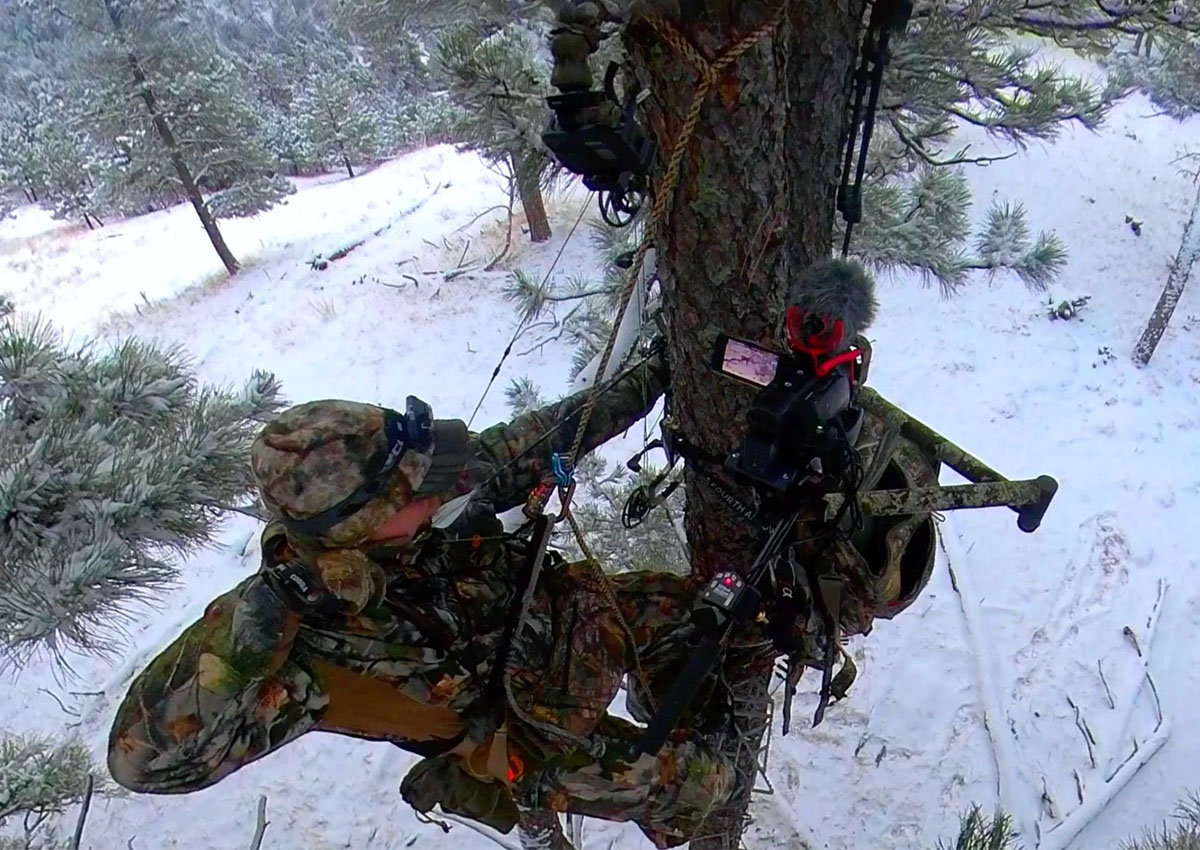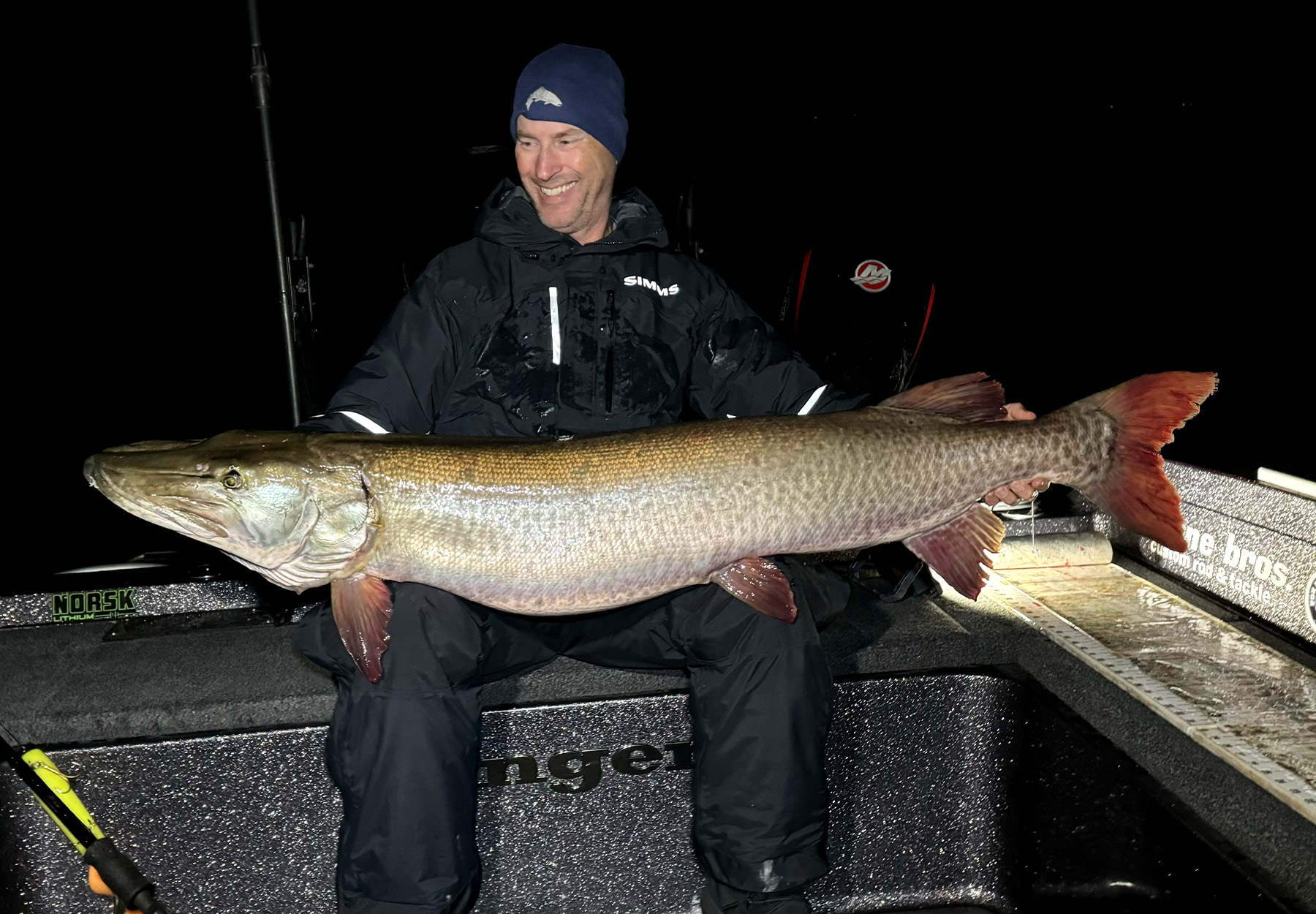We may earn revenue from the products available on this page and participate in affiliate programs. Learn More ›
Filming hunts—whether your own or for a buddy—has always been easier said than done. Controlling the camera in those final moments leading up to the shot can be incredibly difficult. From zooming in on the game to making sure everything is in focus, it’s not for the faint of heart.
Thankfully, camera arms can assist in your filming ventures by removing shaky footage from the equation, and have been a game changer for treestand hunters. For self-filmers in particular, they allow you to “set it and forget it,” which can be the difference between getting the shot off before the animal leaves your shooting lane or not.
When it comes to picking the right camera arm for you, consider your camera and filming style. For heavier cameras, you’ll need a heavy duty camera arm. For self-filmers hiking for miles on public land hunt, you’ll want something that’s sturdy, light, and easy to maneuver in the moments leading up to your shot.
Here are the best camera arms for filming hunts according to top YouTubers and camera operators:
How We Chose the Best Camera Arms for Filming Hunts
I interviewed four of the most prominent names in the YouTube hunting world, who have years of firsthand experience using different camera arms, to find out what works best for them and their channels.
Greg Clements (The Hunting Public)
Greg Clements is one of the original founders of The Woodsguys Inc. and is fondly referred to as “the gear guy” by his peers at The Hunting Public. Clements has over 15 years of experience filming his hunts and has used numerous camera arm platforms to do so. From older heavyweight options to newer lightweight carbon fiber arms, Clements has a lot of experience behind the lens with camera arms.
Riley Weissinger (Chris Bee)
Riley Weissinger is the main camera operator for Chris Bee. Working full time to film Bee’s hunts, Weissinger is incredibly familiar with high-end filming equipment, but comes from a humble background of self-filming on a camcorder in college. With years of experience behind the lens capturing some of the most intense moments in the field, Weissinger is full of great advice for beginners and hunters trying to up their filming game.
Robert Mendoza (Tethrd)
Robert Mendoza works full time behind the lens for Tethrd, a team of saddle hunting fanatics born of a passionate addiction to whitetail hunting. Whether he’s filming hunts or promotional videos announcing a new product, Mendoza has been fully immersed in filming for years. While capturing every aspect of the hunt, he has learned exactly which camera arms help him do the job quickly and effectively.
Joe Rentmeester (The Hunting Beast)
Joe Rentmeester worked alongside Dan Infalt at The Hunting Beast for years. During his time there, he learned a pile of information about self-filming and all of the tips and tricks someone might need to self-film effectively. Although he still classifies himself as a beginner, he is far from it with years of experience behind the bow and lens at the same time. The camera arms he’s used have helped him capture some of his most intense moments in the field.
Best Camera Arms for Filming Hunts: Reviews & Recommendations
Best Overall: Fourth Arrow Talon Micro Triple Arm
See It
Key Features
- Price: $279.99
- 360-degree leveling
- Tool-less leveling
- Pre-set bases
- Weight: 1 pound, 1 ounce
- Total Reach: 29 inches
- Holding Weight: 10 pounds
- Triple arm extension
- ⅜-inch 16 threading for mounting a video head
Pros
- Lightweight aluminum construction
- Collapsable base talons
- Extremely packable design with rubber coated third section
Cons
- With three arm extensions, it’s heavier than the dual arm option
The Fourth Arrow Talon Micro Triple Arm was the most recommended option from our experts. Both Robert Mendoza and Riley Weissinger highly recommend the Talon. For Mendoza, the triple arm feature is perfect for saddle hunting. The three arms allow him to maneuver the camera to wherever he needs it to be while still keeping it out of his way when coming to full draw. Perfect for the mobile hunter, it packs down to 9 by 3.5 inches. It’s the lightest camera arm we could find available that still has a 10-pound holding weight capacity.
For Weissinger, the triple arm allows him more movement in the treestand so that he doesn’t get bound up while trying to maneuver the camera to get the shot. He’s also a huge fan of the tree shoulder bracket mounting system, as it’s easy to adjust and level for the perfect shot. He recommends the Talon Micro Triple Arm to anyone looking for a self-filming option, noting that it’s great for filming your buddy as well.
Best Value: Muddy Hunt Hard Camera Arm, Multi
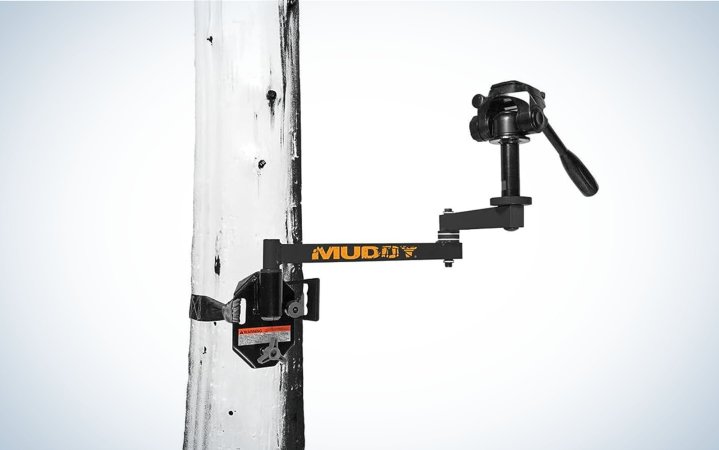
See It
Key Features
- Price: $51.51
- Easy grip camera tightening knob
- Bubble level
- Ratchet strap
- Weight: 5 pounds
- Total Reach: 24 inches
- Holding Weight: 6 pounds
- Dual arm extension
Pros
- Great entry-level price point
- Easily packable and sets up in seconds
- Aluminum construction
- Quiet joints and pivots
Cons
- Less reach than a three arm option
- Less holding weight
- Heavier than other dual arm options
- Mounting system is more difficult with the ratchet strap, and takes larger trees out of the equation for mounting
Every single one of our experts mentioned the Muddy Hunt Hard Camera Arm as their beginner level camera arm. While it’s not quite as adjustable, lightweight, or easy to mount, it’s at a perfect price point for beginners. If you’re just starting out, this camera arm will help you learn what features you like and dislike in a camera arm. It will do the job well enough to capture your hunt. While it is heavier to pack in and won’t support some of the heavier camera options out there as easily, it will be great for most camcorder options that are available.
Best Dual Arm: Fourth Arrow Stiff Arm Ghost
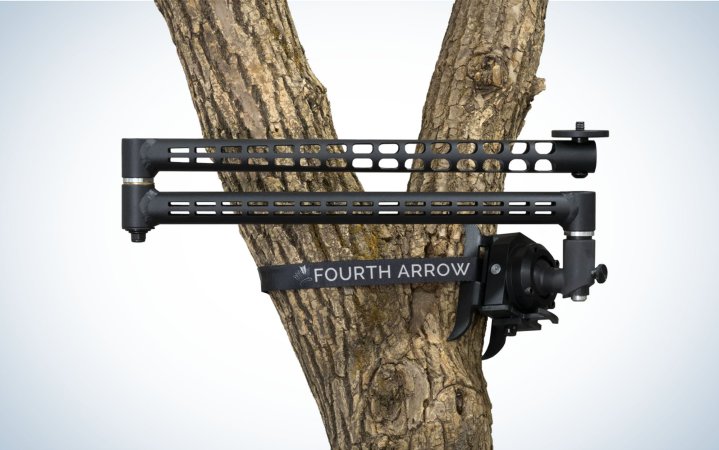
See It
Key Features
- Price: $279.99
- 360-degree leveling
- Tool-less leveling
- Pre-set bases
- Weight: 1 pound, 6 ounces
- Total Reach: 41 inches
- Holding Weight: 8 pounds
- Dual arm extension
- 3/8-inch 16 threading for mounting a video head
Pros
- Super-lightweight aluminum construction
- Collapsable base talons
- Extremely packable design
Cons
- Has a lower holding weight than the Talon Micro Triple Arm
- Dual arm extension makes it harder to maneuver around the tree
The Fourth Arrow Stiff Arm Ghost is the best dual arm option for a very obvious reason. The 41-inch reach it offers is more than most other camera arms on the market, which is great for trees that are less forgiving or slanted where you’ve got your stand. It’s also lightweight. Coming in at just over 1.5 pounds, you’ll forget you’re even carrying it in your bag.
While it may be incredibly lightweight, it’s worth noting that the holding weight is less than some other options. If you’re running a heavy camera setup, this arm might not be the choice for you. However, if you’re running a lighter, camcorder style camera, the Stiff Arm Ghost has a great reach. The Stiff Arm allows you to easily film yourself or your hunting partner, wherever the shot leads.
Best for Non-Pros: Fourth Arrow Baton 2.0
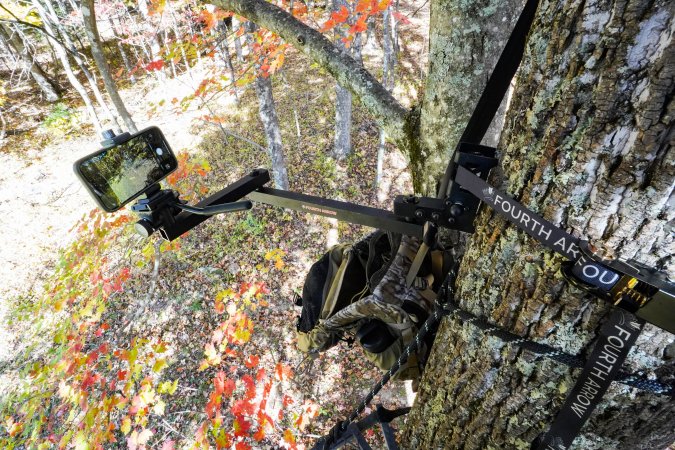
Photo by Scott Einsmann
See It
Key Features
- Price: $170
- Weight: 2 pounds 10 ounces
- Folds down to 15 inches long
- Max Camera Weight: 6 pounds
- Includes pan head, camera arm, mount, and cell phone holder
Pros
- Easy to use
- Smooth
- Fast to attach to tree
- Easy to pack
Cons
I find self filming hunts exceptionally frustrating, but it’s fun showing friends my hunts and it’s valuable for knowing exactly where you hit a deer before blood trailing. I’ve tried using my Sony A7 III and Fourth Arrow Talon, but it’s way too much gear for me to haul and I wanted something that was easier to use. My solution is the Baton 2.0 and my cell phone. That tandem is easy to use, light to pack, and produces video that’s plenty good enough for my uses. I also like that the Baton 2.0 can hold my phone for taking grip and grins solo, by using the shutter timer.

Photo by Scott Einsmann
If you’re not a pro, or want to film your hunts on a budget, the Baton 2.0 combined with an action cam or cell phone is the perfect product for you.
How to Choose the Best Camera Arms for Filming Hunts
After looking through all of our top recommendations, you might find yourself stuck between two of the options above. For most, that decision stems on whether or not you want a dual arm or triple arm. To really make that decision, you have to think about how you hunt and where you hunt.
Our experts that consistently hunt from a saddle highly recommend the triple arm as you can maneuver it around the tree and saddle ropes to get the animal in frame. On the flipside, the dual arm is great for filming a buddy from a double set using either hang-on stands or ladder stands, especially if there’s only one or two main shooting lanes you’re anticipating the shot will present itself in.
A final consideration needs to be how the camera arm attaches to the tree. Some of our options come with pre-set bases, and others will be more tedious to set-up once you’re in the tree without pre-set bases. You’ll pay more for those pre-set base camera arms, but if you value ease of use, they might be worth it for you.
Final Thoughts on the Best Camera Arms for Filming Your Hunts
There are plenty of camera arm options out there for hunters looking to film their hunts. From high-end lightweight arms, to budget-friendly durable options, there’s something here for everyone. Whether you’re self-filming or filming for a hunting partner, a camera arm will help you stabilize your camera, resulting in a cleaner, clearer image.
No matter which camera arm you choose, you won’t be disappointed in any of the options we’ve laid out. Good luck and shoot straight.
Read the full article here

